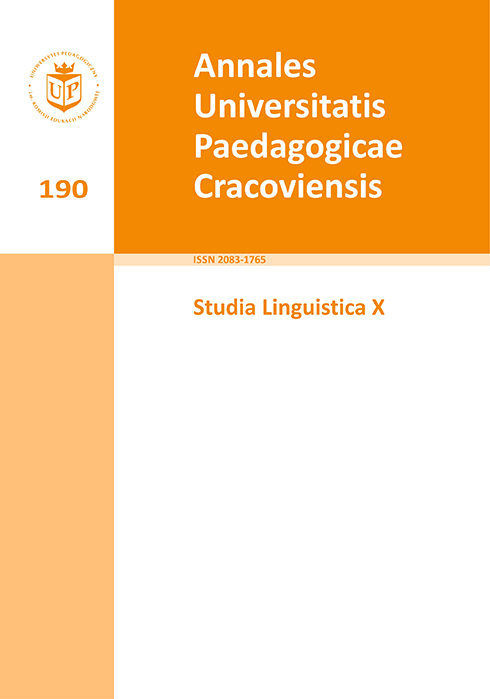A złote jabłko stało się jabłkiem niezgody – o kulturowym i leksykograficznym wymiarze dwóch mitologizmów z komponentem nazywającym owoc
Main Article Content
Abstrakt
In the phraseological stock of Polish there can be found language units which conceal a cultural symbolism of mythological provenance - symbolism that speakers are perhaps sometimes unaware of. In this group tere are two phraseological expressions containing a fruit name (apple) that seem to be genetically related to Greek mythology: the złote jabłko [golden apple] and the jabłko niezgody [apple of discord]. The article presents the etymology of the ‘apple’ lexeme, broadly outlines the symbolism of apple and apple tree in various cultures and mythologies, and eventually discusses, inter alia, (1) mythological motivation of the units under consideration, (2) semantic and formal status of mythology-based phraseological expressions, (3) lexicographic status of both expressions, and (4) their international character.
Downloads
Article Details

Utwór dostępny jest na licencji Creative Commons Uznanie autorstwa – Użycie niekomercyjne – Bez utworów zależnych 4.0 Międzynarodowe.
Autor, zgłaszając tekst do redakcji czasopisma „Annales Universitatis Paedagogicae Cracoviensis. Studia Linguistica”, zaświadcza, iż jest on rezultatem wyłącznie jego własnej twórczości, że treść artykułu nie była dotychczas publikowana oraz że utwór nie narusza w żadnym stopniu praw autorskich ani praw pokrewnych innych osób, jak również innych praw osób trzecich, a także, że niczyje prawa do utworu (lub jego jakiejkolwiek części) nie zostały pominięte. Po podpisaniu umowy prawa majątkowe do opublikowanych materiałów zostają przeniesione na Uniwersytet Komisji Edukacji Narodowej w Krakowie.
Rocznik „Annales Universitatis Paedagogicae Cracoviensis. Studia Linguistica” to czasopismo o otwartym dostępie, a cała jego zawartość jest udostępniana bezpłatnie dla użytkowników i instytucji na zasadach licencji Creative Commons CC-BY-NC-ND 4.0 (uznanie autorstwa, użycie niekomercyjne, bez utworów zależnych). Na podstawie tej licencji autorzy zgadzają się, że ich prace mogą być zgodnie z prawem ponownie wykorzystywane do jakichkolwiek celów, za wyjątkiem celów komercyjnych, bez konieczności uzyskania uprzedniej zgody ze strony autora lub wydawcy. Każdy może prace te czytać, pobierać, kopiować, drukować, rozpowszechniać oraz przetwarzać, pod warunkiem poprawnego oznaczenia autorstwa oraz oryginalnego miejsca publikacji. Publikowanych tekstów nie można wykorzystywać do tworzenia utworów zależnych (np. do tłumaczenia ich i publikowania w innym języku bez zgody wydawcy). Jest to zgodne z definicją otwartego dostępu BOAI (Budapest Open Access Initiative) „Studia Linguistica”nie pobiera opłat za składanie artykułów ani ich przetwarzanie.
Autor, przesyłając artykuł do redakcji „Studia Linguistica”, bezwględnie zgadza się z poniższymi punktami:
-
Oświadczam, że jestem Autorem lub Współautorem nadesłanego tekstu. Przesłany tekst nie był nigdzie publikowany, jest całkowicie oryginalny i nie narusza w żadnym stopniu praw autorskich ani praw pokrewnych innych osób, jak również innych praw osób trzecich, a także, że niczyje prawa do utworu nie zostały pominięte.
-
Oświadczam, że nadesłany tekst nie został złożony do recenzji lub/i publikacji w innym czasopiśmie.
-
Przyjmuję do wiadomości, że Autor ponosi pełną odpowiedzialność za każdy przypadek plagiatu, niezależnie od tego, czy został on wykryty podczas procesu recenzji, czy po publikacji w „Studia Linguistica”.
-
Oświadczam, że ponoszę pełną odpowiedzialność finansową i prawną za wszelkie roszczenia związane z utworem.
-
Potwierdzam uznanie wszystkich źródeł danych wykorzystanych i cytowanych w badaniach.
-
Potwierdzam, że artykuł został wykonany z należytą starannością zgodnie ze standardami edytorskimi „Studia Linguistica”.
Bibliografia
Bartmiński J. (red.), 2012, Słownik stereotypów i symboli ludowych, t. 1: Kosmos, z. 4: Świat, światło, metale, Lublin.
Google Scholar
Basaj M., 1988, O polu semantycznym internacjonalizmów frazeologicznych, „Z Polskich Studiów Slawistycznych”, seria 7, s. 29–35.
Google Scholar
Bańkowski A., 2000, Etymologiczny słownik języka polskiego, t. 1, Warszawa.
Google Scholar
Biedermann H., 2001, Leksykon symboli, tłum. J. Rubinowicz, Warszawa.
Google Scholar
Boryś W., 2005, Słownik etymologiczny języka polskiego, Kraków.
Google Scholar
Burszta W.J., 1998, Antropologia kultury. Tematy, teorie, interpretacje, Poznań.
Google Scholar
Chenel Á.P., Simarro A.S., 2008, Słownik symboli, tłum. M. Boberska, Warszawa.
Google Scholar
Chlebda W., 2005, Szkice o skrzydlatych słowach. Interpretacje lingwistyczne, Opole.
Google Scholar
Grimal P., 1997, Słownik mitologii greckiej i rzymskiej, Wrocław – Warszawa – Kraków.
Google Scholar
Kopaliński W., 1990, Słownik symboli, Warszawa.
Google Scholar
Krzyżyk D., 2009, Znajomość związków frazeologicznych o rodowodzie mitologicznym (na podstawie badań wśród studentów), [w:] Język żyje. Rzecz o współczesnej polszczyźnie, red. K. Ożóg, Rzeszów, s. 134–141.
Google Scholar
Lewicki A.M., Pajdzińska A., 2001, Frazeologia, [w:] Współczesny język polski, red. J. Bartmiński, Lublin, s. 315–333.
Google Scholar
Lurker M., 1989, Słownik obrazów i symboli biblijnych, tłum. bp K. Romaniuk, Poznań.
Google Scholar
Lurker M., 1994, Przesłanie symboli w mitach, kulturach i religiach, tłum. R. Wojnakowski, Kraków.
Google Scholar
Maćkiewicz J., 2001, Wyrazy międzynarodowe (internacjonalizmy) we współczesnym języku polskim, [w:] Współczesny język polski, red. J. Bartmiński, Lublin , s. 555–562.
Google Scholar
Michalunio C., 2008, Dicta. Zbiór łacińskich sentencji, przysłów, zwrotów i powiedzeń z indeksem osobowym i tematycznym, Kraków.
Google Scholar
Oesterreicher-Mollwo M. (oprac.), 1992, Leksykon symboli, tłum. J. Prokopiuk, Warszawa.
Google Scholar
Oleśkiewicz A., 2007, Europa języków. Związki frazeologiczne o proweniencji biblijnej i antycznej w europejskiej wspólnocie słownikowej, Kraków.
Google Scholar
Plezia M., 2001, Tysiąclecie kultury antycznej w Polsce, [w:] idem, Scripta minora. Łacina średniowieczna i Wincenty Kadłubek, Kraków, s. 163–174.
Google Scholar
Puda-Blokesz M., 2011, Wariantywność mitologizmów frazeologicznych w świetle danych leksykograficznych, [w:] Perspektywy współczesnej frazeologii polskiej. Wariantyw- we frazeologii, red. P. Fliciński, Poznań, s. 81–93.
Google Scholar
Puda-Blokesz M., 2014, Mitologizmy frazeologiczne w języku polskim (na materiale leksykografii XX i XXI wieku), Kraków.
Google Scholar
Puda-Blokesz M. (w druku), Wokół problemów genezy polskich mitologizmów frazeologicznych, [w:] Perspektywy współczesnej frazeologii polskiej. Geneza dawnych i nowych frazeologizmów polskich, red. G. Dziamska-Lenart, J. Liberek, Poznań.
Google Scholar
Sinko T., 1988, Antyk w literaturze polskiej. Prace komparatystyczne, wybór i oprac. T. Bieńkowski, wstęp S. Stabryła, Warszawa.
Google Scholar
Sobol E. (red.), 1996, Słownik wyrazów obcych, Warszawa.
Google Scholar
Stabryła S., 2007, Złote jabłka Afrodyty. Greckie legendy o miłości, Warszawa.
Google Scholar
Zamarovský V., 2006, Encyklopedia mitologii antycznej, tłum. J. Illg, L. Spyrka, J. Wania, Warszawa.
Google Scholar
